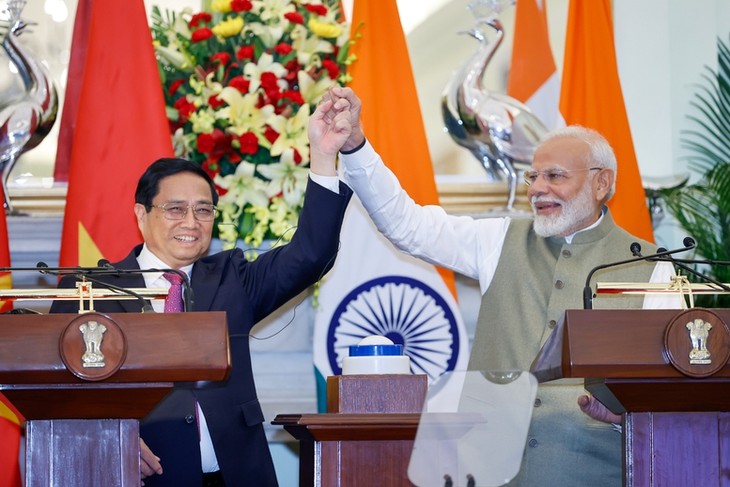(VOVWORLD) - Vietnam and India issued a Joint Statement on Strengthening of the Comprehensive Strategic Partnership between Vietnam and India on the occasion of Prime Minister Pham Minh Chinh’s State visit to India from July 30-August 1.
 Vietnamese Prime Minister Pham Minh Chinh and Indian Prime Minister Narendra Modi (Photo: VGP) Vietnamese Prime Minister Pham Minh Chinh and Indian Prime Minister Narendra Modi (Photo: VGP) |
The Joint Statement says that the leaders agreed to further strengthen the Vietnam- India Comprehensive Strategic Partnership in all areas.
In regard to economic, trade and investment cooperation, the leaders of India and Vietnam agreed to reinforce cooperation at the level of governments and businesses for increasing two-way trade, investment and technological partnership. The leaders agreed to further elevate trade from the present level of around US$ 15 billion and continue efforts to promote investment flows between the two countries.
India welcomed Vietnam's decision to join the Coalition on the Disaster Resilient Infrastructure and early completion of domestic procedures to officially join the International Solar Alliance. Vietnam appreciated India’s Global Bio-fuel Alliance initiative.
As two coastal countries in the region, they agreed to bolster cooperation in oceanography, marine sciences and blue economy, as well as in capacity building in this area. The leaders also reiterated their mutually beneficial cooperation in the oil and gas sector, including exploration and production in Vietnam's continental shelf.
In regard to defense and security cooperation, they agreed to further enhance defense cooperation based on mutual interest and priorities of the two countries which will also contribute to greater stability in the wider Indo-Pacific region.
The leaders reiterated the significance of digital technologies and encouraged the development of a framework to promote bilateral cooperation in financial innovation and digital payments between Vietnam and India.
The two leaders pledged stronger cooperation in culture, tourism, and people-to-people exchanges.
Underlining the link between prosperity and security, the leaders reaffirmed the importance of maintaining peace, stability, security and freedom of navigation and overflight in the East Sea (internationally known as South China Sea), while pursuing the peaceful resolution of disputes in accordance with international law, particularly the 1982 United Nations Convention on the Law of the Sea (UNCLOS), without resorting to threat or use of force. Both leaders further called for the full and effective implementation of the Declaration on the Conduct of Parties in the East Sea (DOC) in its entirety and the substantive negotiations towards the early conclusion of a substantive and effective Code of Conduct in the East Sea (COC) in accordance with international law, especially UNCLOS, that does not prejudice the legitimate rights and interests of all nations including those not party to these negotiations.
Both leaders unequivocally condemned terrorism in all forms and manifestations, including cross-border terrorism.